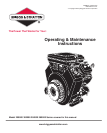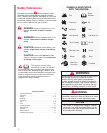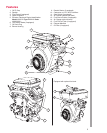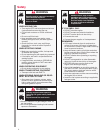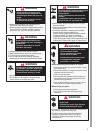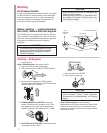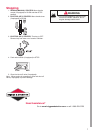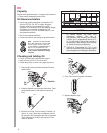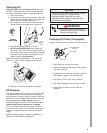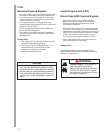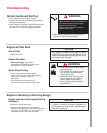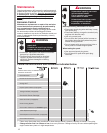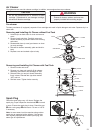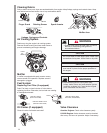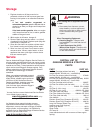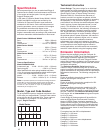
4
Safety
Gasoline and its vapors are extremely
flammable and explosive.
Fire or explosion can cause severe
burns or death.
WHEN ADDING FUEL
• Turn engine OFF and let engine cool at least
2 minutes before removing gas cap.
• Fill fuel tank outdoors or in well-ventilated
area.
• Do not overfill fuel tank.
• Keep gasoline away from sparks, open
flames, pilot lights, heat, and other ignition
sources.
• Check fuel lines, tank, cap, and fittings
frequently for cracks or leaks. Replace if
necessary.
WHEN STARTING ENGINE
• Make sure spark plug, muffler, fuel cap and
air cleaner are in place.
• Do not crank engine with spark plug removed.
• If fuel spills, wait until it evaporates before
starting engine.
• If engine floods, set choke to OPEN/RUN
position, place throttle in FAST and crank
until engine starts.
WHEN OPERATING EQUIPMENT
• Do not choke carburetor to stop engine.
WHEN TRANSPORTING EQUIPMENT
• Transport with fuel tank EMPTY.
WHEN STORING GASOLINE OR EQUIP-
MENT WITH FUEL IN TANK
• Store away from furnaces, stoves, water
heaters or other appliances that have pilot
light or other ignition source because they
can ignite gasoline vapors.
WARNING
Starting engine creates sparking.
Sparking can ignite nearby flammable
gases.
Explosion and fire could result.
• If there is natural or LP gas leakage in area, do
not start engine.
• Do not use pressurized starting fluids because
vapors are flammable.
WARNING
Gaseous fuels, such as liquid
petroleum gas (LPG) and natural
gas (NG), are extremely flammable
and can readily form explosive
air-vapor mixtures at moderate
temperatures.
WARNING
IF YOU SMELL GAS:
• DO NOT start the engine.
• DO NOT actuate any electrical switches.
• DO NOT use the phone in the vicinity.
• Evacuate the area.
• Contact the gas supplier or fire department.
REMEMBER:
• LPG vapor is heavier than air and tends to
collect in low areas. NG vapor is lighter then
air and tends to collect in high areas. Both may
travel to remote locations.
• Keep all flames, sparks, pilot lights and other
ignition sources away from the area where the
engine is operated or repaired.
• DO NOT smoke when operating or repairing
the engine.
• DO NOT store gasoline or other flammable
vapors or liquids in the vicinity of the engine.
• BEFORE doing any service work to the
engine, shut off the gas supply.
• After initial installation or servicing, check for
gas leaks. DO NOT use an open flame. Apply
very soapy water or leak test solution with a
brush and look for bubbles.
• Keep the equipment and the area surrounding
the engine free of debris.
• Install the fuel system according to applicable
fuel/gas codes.



